Installing the apk reveals very little:
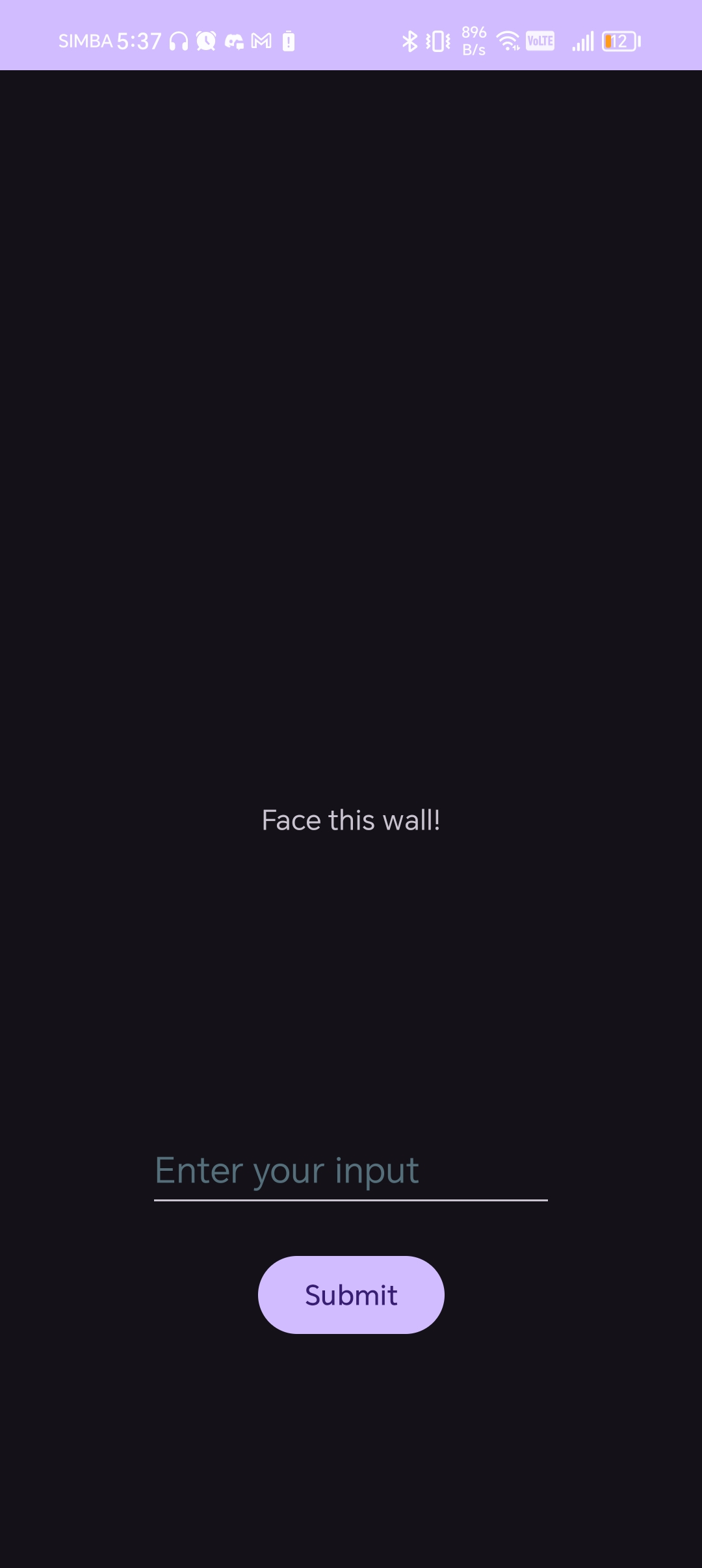
Java decompilation
I used jadx to decompile the apk: jadx wallfacer-x86_64.apk. We can see a number of decompiled java files under sources/com/wall/facer:
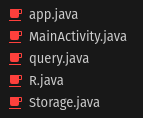
Storage is a simple class implementing the singleton pattern, with a secretMessage property:
package com.wall.facer; /* loaded from: classes.dex */ public class Storage { private static Storage instance; private String secretMessage; private Storage() { } public static synchronized Storage getInstance() { Storage storage; synchronized (Storage.class) { try { if (instance == null) { instance = new Storage(); } storage = instance; } catch (Throwable th) { throw th; } } return storage; } public synchronized String getMessage() { return this.secretMessage; } public synchronized void saveMessage(String str) { this.secretMessage = str; } }Storage.java
MainActivity.java is the controller for the above home page. Its implementation is also very barebones:
package com.wall.facer; import android.os.Bundle; import android.view.View; import android.widget.EditText; /* loaded from: classes.dex */ public class MainActivity extends C0 { public EditText y; @Override // defpackage.C0, defpackage.O3, android.app.Activity public final void onCreate(Bundle bundle) { super.onCreate(bundle); setContentView(R.layout.activity_main); this.y = (EditText) findViewById(R.id.edit_text); } public void onSubmitClicked(View view) { Storage.getInstance().saveMessage(this.y.getText().toString()); } }MainActivity.java
There is another activity class, query:
package com.wall.facer; import android.content.Context; import android.os.Bundle; import android.util.Base64; import android.util.Log; import android.view.View; import android.widget.EditText; import javax.crypto.Cipher; import javax.crypto.spec.IvParameterSpec; import javax.crypto.spec.SecretKeySpec; /* loaded from: classes.dex */ public class query extends C0 { public EditText y; public EditText z; @Override // defpackage.C0, defpackage.O3, android.app.Activity public final void onCreate(Bundle bundle) { super.onCreate(bundle); setContentView(R.layout.activity_query); this.y = (EditText) findViewById(R.id.key_text); this.z = (EditText) findViewById(R.id.iv_text); } public void onSubmitClicked(View view) { Context applicationContext = getApplicationContext(); String obj = this.y.getText().toString(); String obj2 = this.z.getText().toString(); try { byte[] decode = Base64.decode(applicationContext.getString(R.string.str), 0); byte[] bytes = obj.getBytes(); byte[] bytes2 = obj2.getBytes(); Cipher cipher = Cipher.getInstance("AES/CBC/PKCS5Padding"); cipher.init(2, new SecretKeySpec(bytes, "AES"), new IvParameterSpec(bytes2)); Log.d(getString(R.string.tag), "Decrypted data: ".concat(new String(cipher.doFinal(decode)))); } catch (Exception unused) { Log.e(getString(R.string.tag), "Failed to decrypt data"); } } }query.java
It seems to be a page where string decryption is going on, however we have to provide the key and iv. The value of R.string.str can be found under resources/res/values/strings.xml:
... <string name="str">4tYKEbM6WqQcItBx0GMJvssyGHpVTJMhpjxHVLEZLVK6cmIH7jAmI/nwEJ1gUDo2</string> ...strings.xml
Looking around the file, I found a few other interesting strings:
... <string name="base">d2FsbG93aW5wYWlu</string> ... <string name="dir">ZGF0YS8</string> ... <string name="filename">c3FsaXRlLmRi</string> ...strings.xml
They seem to also be base64-encoded. Decoding them gives base = wallowinpain, dir = data/, filename = sqlite.db.
Under resources/assets, I noticed a sqlite.db file. However, attempts to open it were met with the error: file is not a database. I tried various methods to patch the file unsuccessfully. Furthermore, a strings check on the file does not return any readable text except for the sqlite header.
Stuff that didn't work
At this point, I went down a few different rabbit holes. Following the hint in the challenge description that something was being loaded at runtime, I rooted my android emulator (took way longer than I would like to admit) and used Fridump to dump the app memory. I thought that perhaps the sqlite file was being decrypted at runtime, so the decrypted file would be in the memory dump. This proved to be false.
Eventually, I returned to the three mysterious strings and tried to figure out where they were being used. We can find the string ids in R.java
... public static final int base = 0x7f0f001e; ... public static final int dir = 0x7f0f0030; ... public static final int filename = 0x7f0f0038; ...R.java
Running a global search for the string ids (both hex and decimal format) yielded nothing. Maybe they are referenced in binary files? I searched for this using: grep -aRP '8\x00\x0f\x7f' .. Sure enough, a match was returned for filename's id inside resoucers/classes.dex. I postulated that the java decompilation was missing something, so I looked in the smali decompilation (smali is basically a human readable representation of Dalvik bytecode, so decompiling to smali is lossless).
Using apktool d wallfacer-x86_64.apk, we can access the smali files. Searching for 0x7f0f0038 shows that is being used in K0.smali.
Extracting DynamicClass
We reverse it section by section:
const v0, 0x7f0f0038 :try_start_0 invoke-virtual {p0, v0}, Landroid/content/Context;->getString(I)Ljava/lang/String; move-result-object v0K0.smali
Fortunately, the smali decompilation is verbose enough that we can kind of figure out what's going on. For parts that I didn't understand, I consulted ChatGPT or Google. The above section does something like v0 = context.getString(0x7f0f0038).
new-instance v1, Ljava/lang/String; const/4 v2, 0x0 invoke-static {v0, v2}, Landroid/util/Base64;->decode(Ljava/lang/String;I)[B move-result-object v0 invoke-direct {v1, v0}, Ljava/lang/String;-><init>([B)V invoke-static {p0, v1}, LA8;->K(Landroid/content/Context;Ljava/lang/String;)Ljava/nio/ByteBuffer; move-result-object v0K0.smali
Now this does v0 = A8.K(context, new String(Base64.decode(v0, 0))). We will investigate the A8.K function later.
new-instance v1, Ldalvik/system/InMemoryDexClassLoader; invoke-virtual {p0}, Landroid/content/Context;->getClassLoader()Ljava/lang/ClassLoader; move-result-object v2 invoke-direct {v1, v0, v2}, Ldalvik/system/InMemoryDexClassLoader;-><init>(Ljava/nio/ByteBuffer;Ljava/lang/ClassLoader;)VK0.smali
v1 = new InMemoryDexClassLoader(v0, context.getClassLoader())
const-string v0, "DynamicClass" invoke-virtual {v1, v0}, Ljava/lang/ClassLoader;->loadClass(Ljava/lang/String;)Ljava/lang/Class; move-result-object v0K0.smali
v0 = v1.loadClass("DynamicClass")
const-class v1, Landroid/content/Context; filled-new-array {v1}, [Ljava/lang/Class; move-result-object v1 const-string v2, "dynamicMethod" invoke-virtual {v0, v2, v1}, Ljava/lang/Class;->getMethod(Ljava/lang/String;[Ljava/lang/Class;)Ljava/lang/reflect/Method; move-result-object v0K0.smali
v0.getMethod("dynamicMethod", new java.lang.Class[] { android.content.Context })
So it seems that A8.K is loading bytecode used to construct DynamicClass, and the method dynamicMethod is then invoked on it.
Fortunately for us, the A8 class seems to be correctly decompiled to java and we can find it under sources/defpackage (in the jadx decompilation).
public static ByteBuffer K(Context context, String str) { int i2; InputStream open = context.getAssets().open(str); ByteArrayOutputStream byteArrayOutputStream = new ByteArrayOutputStream(); byte[] bArr = new byte[1024]; while (true) { int read = open.read(bArr); if (read == -1) { break; } byteArrayOutputStream.write(bArr, 0, read); } open.close(); byte[] byteArray = byteArrayOutputStream.toByteArray(); // here, contents of assets/sqlite.db have been read to byteArray byte[] bArr2 = new byte[128]; byte[] bArr3 = new byte[4]; System.arraycopy(byteArray, 4096, bArr3, 0, 4); int i3 = ByteBuffer.wrap(bArr3).getInt(); byte[] bArr4 = new byte[i3]; System.arraycopy(byteArray, 4100, bArr4, 0, i3); System.arraycopy(byteArray, 4100 + i3, bArr2, 0, 128); C0289q1 c0289q1 = new C0289q1(bArr2); byte[] bArr5 = new byte[i3]; int i4 = 0; int i5 = 0; for (i2 = 0; i2 < i3; i2++) { i4 = (i4 + 1) & 255; byte[] bArr6 = (byte[]) c0289q1.c; byte b2 = bArr6[i4]; i5 = (i5 + (b2 & 255)) & 255; bArr6[i4] = bArr6[i5]; bArr6[i5] = b2; bArr5[i2] = (byte) (bArr6[(bArr6[i4] + b2) & 255] ^ bArr4[i2]); } return ByteBuffer.wrap(bArr5); }A8.java
Here, the contents of sqlite.db are read to byteArray, and some copying is done. The signature of System.arraycopy is arraycopy(Object src, int srcPos, Object dest, int destPos, int length). The first 4 bytes read to bArr3 seem to be a length specifier, and the specified number of bytes is then read into bArr4, then the next 128 bytes are read to bArr2. Then the C0289q1 class is created. I looked up the implementation:
public C0289q1(byte[] bArr) { this.a = 17; this.b = bArr; this.c = new byte[256]; for (int i = 0; i < 256; i++) { ((byte[]) this.c)[i] = (byte) i; } int i2 = 0; for (int i3 = 0; i3 < 256; i3++) { byte[] bArr2 = (byte[]) this.c; byte b = bArr2[i3]; byte[] bArr3 = (byte[]) this.b; i2 = (i2 + (b & 255) + (bArr3[i3 % bArr3.length] & 255)) & 255; bArr2[i3] = bArr2[i2]; bArr2[i2] = b; } }C0289q1.java
I can't remember whether I reversed the function logic, but either way it is not necessary to figure out exactly what is going on, since the function is just moving values around. All we need for decryption is the sqlite.db file, and to translate the algorithm to python:
with open('sqlite.db', 'rb') as f: data = f.read() chunksize = int.from_bytes(data[4096:4100], 'big') chunk = data[4100: 4100+chunksize] keything = data[4100+chunksize: 4100+chunksize+128] # calculate c0289q1.c c = [i for i in range(256)] acc = 0 for i in range(256): temp = c[i] acc = (acc + temp + keything[i % 128]) & 255 c[i] = c[acc] c[acc] = temp print(c) bArr5 = [0 for _ in range(chunksize)] i4 = 0 i5 = 0 for i in range(chunksize): i4 = (i4 + 1) & 255 b2 = c[i4] i5 = (i5 + (b2 & 255)) & 255 c[i4] = c[i5] c[i5] = b2 bArr5[i] = (c[(c[i4] + b2) & 255] ^ chunk[i]) with open('output.dex', 'wb') as f: f.write(bytes(bArr5))h.py
Extracting libnative.so
The resulting .dex file can be decompiled with jadx output.dex. Then we have the decompiled class under output/sources/defpackage (I added some comments):
package defpackage; import android.content.Context; import android.content.res.AssetManager; import android.content.res.Resources; import android.os.SystemClock; import android.util.Base64; import android.util.Log; import java.io.File; import java.io.FileOutputStream; import java.io.IOException; import java.io.InputStream; import java.lang.reflect.InvocationTargetException; import java.lang.reflect.Method; import java.util.Arrays; import java.util.Comparator; /* renamed from: DynamicClass reason: default package */ /* loaded from: /home/smalldonkey/ctf/tisc24/l8/l8/wallfacer-x86_64/resources/assets/output.dex */ public class DynamicClass { static final /* synthetic */ boolean $assertionsDisabled = false; private static final String TAG = "TISC"; public static native void nativeMethod(); public static void dynamicMethod(Context context) throws Exception { pollForTombMessage(); Log.i(TAG, "Tomb message received!"); File generateNativeLibrary = generateNativeLibrary(context); try { System.load(generateNativeLibrary.getAbsolutePath()); } catch (Throwable th) { String message = th.getMessage(); message.getClass(); Log.e(TAG, message); System.exit(-1); } Log.i(TAG, "Native library loaded!"); if (generateNativeLibrary.exists()) { generateNativeLibrary.delete(); } pollForAdvanceMessage(); Log.i(TAG, "Advance message received!"); nativeMethod(); } private static void pollForTombMessage() throws ClassNotFoundException, NoSuchMethodException, InvocationTargetException, IllegalAccessException { Class<?> cls; do { SystemClock.sleep(1000L); cls = Class.forName("com.wall.facer.Storage"); } while (!DynamicClass$$ExternalSyntheticBackport1.m((String) cls.getMethod("getMessage", new Class[0]).invoke(cls.getMethod("getInstance", new Class[0]).invoke(null, new Object[0]), new Object[0]), "I am a tomb")); // Storage.getInstance().getMessage() == "I am a tomb" } private static void pollForAdvanceMessage() throws ClassNotFoundException, NoSuchMethodException, InvocationTargetException, IllegalAccessException { Class<?> cls; do { SystemClock.sleep(1000L); cls = Class.forName("com.wall.facer.Storage"); } while (!DynamicClass$$ExternalSyntheticBackport1.m((String) cls.getMethod("getMessage", new Class[0]).invoke(cls.getMethod("getInstance", new Class[0]).invoke(null, new Object[0]), new Object[0]), "Only Advance")); // Storage.getInstance().getMessage() == "Only Advance" } public static File generateNativeLibrary(Context context) throws ClassNotFoundException, NoSuchMethodException, InvocationTargetException, IllegalAccessException, IOException { AssetManager assets = context.getAssets(); Resources resources = context.getResources(); String str = new String(Base64.decode(resources.getString(resources.getIdentifier("dir", "string", context.getPackageName())) + "=", 0)); // str = "data/" String[] list = assets.list(str); // sort files alphabetically Arrays.sort(list, new Comparator() { // from class: DynamicClass$$ExternalSyntheticLambda3 @Override // java.util.Comparator public final int compare(Object obj, Object obj2) { int m; m = DynamicClass$$ExternalSyntheticBackport0.m(Integer.parseInt(((String) obj).split("\\$")[0]), Integer.parseInt(((String) obj2).split("\\$")[0])); return m; } }); String str2 = new String(Base64.decode(resources.getString(resources.getIdentifier("base", "string", context.getPackageName())), 0)); // str2 = "wallowinpain" File file = new File(context.getFilesDir(), "libnative.so"); Method method = Class.forName("Oa").getMethod("a", byte[].class, String.class, byte[].class); FileOutputStream fileOutputStream = new FileOutputStream(file); try { for (String str3 : list) { InputStream open = assets.open(str + str3); byte[] readAllBytes = open.readAllBytes(); open.close(); fileOutputStream.write((byte[]) method.invoke(null, readAllBytes, str2, Base64.decode(str3.split("\\$")[1] + "==", 8))); } fileOutputStream.close(); return file; } catch (Throwable th) { try { fileOutputStream.close(); } catch (Throwable th2) { Throwable.class.getDeclaredMethod("addSuppressed", Throwable.class).invoke(th, th2); } throw th; } } }DynamicClass.java
dynamicMethod waits for the "I am a tomb" message, then loads a native library. This native library is dynamically loaded in generateNativeLibrary.
Reading the decompilation, generateNativeLibrary is reading the files under assets/data, decrypting them, then combining the result to form the final native library. Let's take a look at the decryption function, Oa.a:
package defpackage; import javax.crypto.Cipher; import javax.crypto.SecretKeyFactory; import javax.crypto.spec.GCMParameterSpec; import javax.crypto.spec.PBEKeySpec; import javax.crypto.spec.SecretKeySpec; /* renamed from: Oa reason: default package */ /* loaded from: classes.dex */ public class Oa { public static byte[] a(byte[] bArr, String str, byte[] bArr2) { byte[] b = b(str, bArr2); Cipher cipher = Cipher.getInstance("AES/GCM/NoPadding"); byte[] bArr3 = new byte[12]; int length = bArr.length - 12; byte[] bArr4 = new byte[length]; System.arraycopy(bArr, 0, bArr3, 0, 12); System.arraycopy(bArr, 12, bArr4, 0, length); cipher.init(2, new SecretKeySpec(b, "AES"), new GCMParameterSpec(128, bArr3)); return cipher.doFinal(bArr4); } private static byte[] b(String str, byte[] bArr) { return SecretKeyFactory.getInstance("PBKDF2WithHmacSHA256").generateSecret(new PBEKeySpec(str.toCharArray(), bArr, 16384, 256)).getEncoded(); } }Oa.java
So the function a is doing AES GCM decryption. I compiled the necessary parts together to form the following java script:
import java.io.File; import java.io.FileInputStream; import java.io.IOException; import java.util.Base64; import java.util.Arrays; import java.util.Comparator; import javax.crypto.Cipher; import javax.crypto.SecretKeyFactory; import javax.crypto.spec.GCMParameterSpec; import javax.crypto.spec.PBEKeySpec; import javax.crypto.spec.SecretKeySpec; import java.io.FileOutputStream; public class h2 { public static byte[] a(byte[] bArr, String str, byte[] bArr2) throws Throwable { byte[] b = b(str, bArr2); Cipher cipher = Cipher.getInstance("AES/GCM/NoPadding"); byte[] bArr3 = new byte[12]; int length = bArr.length - 12; byte[] bArr4 = new byte[length]; System.arraycopy(bArr, 0, bArr3, 0, 12); System.arraycopy(bArr, 12, bArr4, 0, length); cipher.init(2, new SecretKeySpec(b, "AES"), new GCMParameterSpec(128, bArr3)); return cipher.doFinal(bArr4); } private static byte[] b(String str, byte[] bArr) throws Throwable { return SecretKeyFactory.getInstance("PBKDF2WithHmacSHA256").generateSecret(new PBEKeySpec(str.toCharArray(), bArr, 16384, 256)).getEncoded(); } public static void main(String[] args) { try { File folder = new File("data/"); File outFile = new File("libnative.so"); FileOutputStream fileOutputStream = new FileOutputStream(outFile); // Check if the folder exists and is indeed a directory if (!folder.exists() || !folder.isDirectory()) { System.out.println("Invalid folder path."); return; } // List all files in the directory File[] files = folder.listFiles(); Arrays.sort(files, new Comparator<File>() { @Override public int compare(File o1, File o2) { int n1 = Integer.parseInt(o1.getName().split("\\$")[0]); int n2 = Integer.parseInt(o2.getName().split("\\$")[0]); return n1 - n2; } }); if (files != null) { for (File file : files) { if (file.isFile()) { // Only process files (not directories) System.out.println("reading file: " + file.getName()); try (FileInputStream fis = new FileInputStream(file)) { // Read file into byte array byte[] fileBytes = new byte[(int) file.length()]; fis.read(fileBytes); // Call the function with filename and file bytes byte[] result = a(fileBytes, "wallowinpain", Base64.getDecoder().decode(file.getName().split("\\$")[1].replace('-', '+').replace('_', '/') + "==")); fileOutputStream.write(result); } catch (IOException e) { System.out.println("Error reading file: " + file.getName()); e.printStackTrace(); } } } fileOutputStream.close(); } else { System.out.println("No files found in the folder."); } } catch (Throwable th) { System.out.println("An error occurred: " + th); } } }h2.java
I placed this file in resources/assets. Compile with javac h2.java and run it with java h2.java, and libnative.so pops out.
Loading libnative.so
To do testing with this library I created a new project in Android Studio. Then I created a jniLibs folder under app/src/main, a subfolder x86_64 under that, and copied libnative.so there. To load the library, I created the following java class:
package com.example.myapplication; public class DynamicClass { static { System.loadLibrary("native"); } public static native void nativeMethod(); }DynamicClass.java
I called nativeMethod when the main activity starts:
... override fun onStart() { super.onStart() DynamicClass.nativeMethod() } ...MainActivity.kt
Now running the app, we can open up the LogCat window and filter by "TISC":

Unfortunately, get the error above: java.lang.UnsatisfiedLinkError: No implementation found for void com.example.myapplication.DynamicClass.nativeMethod() (tried Java_com_example_myapplication_DynamicClass_nativeMethod and Java_com_example_myapplication_DynamicClass_nativeMethod__). So android requires a specific function name to resolve the native function, in the format Java_<package>_<class_name>_<method_name>.
Because it's a dynamically loaded java class, the package field is omitted, so the function in libnative.so is just called Java_DynamicClass_nativeMethod. But how do we get android to omit the package name when it searches for the function?
My solution was to rename the symbol in libnative.so to Java_com_a_a_Test_nativeMethod. This is the same length as the original function name so no problems should occur. I created a new android project with the package name com.a.a, and the java class named Test. Everything else remained the same. Here is the python script used to patch it:
import lief with open('libnative.so', 'rb') as f: data = f.read() newdata = data[:] # NOTE: the following doesnt work, i have no idea why... # newdata = newdata.replace(b'Java_DynamicClass_nativeMethod', b'Java_com_a_a_Test_nativeMethod') with open('libnative1.so', 'wb') as f: f.write(newdata) # instead i have to use lief to change method name: lib = lief.parse('libnative1.so') for x in lib.exported_symbols: if x.name == 'Java_DynamicClass_nativeMethod': x.name = 'Java_com_a_a_Test_nativeMethod' lib.write('libnative1.so') lib.write('/home/smalldonkey/dev/android/A/app/src/main/jniLibs/x86_64/libnative1.so') # for conveniencepatch.py
In Test.java I changed System.loadLibrary("native") to System.loadLibrary("native1"). Running the app again, we see more logs, showing that the function was invoked successfully:
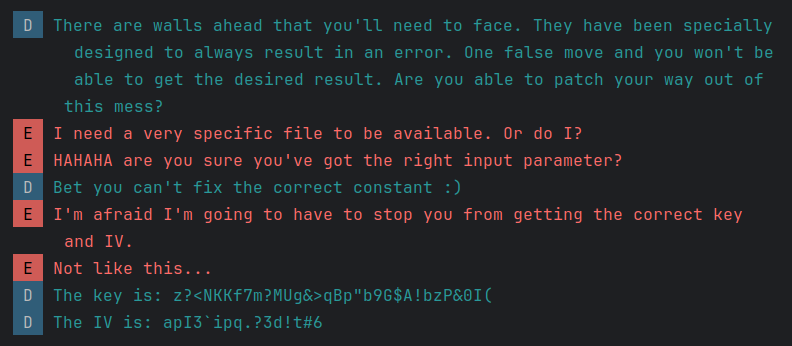
Recalling the query.java activity earlier, I tried using the printed key and iv to decrypt the string:
import java.util.Base64; import java.util.Arrays; import javax.crypto.Cipher; import javax.crypto.spec.IvParameterSpec; import javax.crypto.spec.SecretKeySpec; class Decrypt { public static void main(String[] args) { try { byte[] decode = Base64.getDecoder().decode("4tYKEbM6WqQcItBx0GMJvssyGHpVTJMhpjxHVLEZLVK6cmIH7jAmI/nwEJ1gUDo2"); byte[] bytes = "z?<NKKf7m?MUg&>qBp\"b9G$A!bzP&0I(".getBytes(); System.out.println(bytes.length); byte[] bytes2 = "apI3`ipq.?3d!t#6".getBytes(); System.out.println(bytes2.length); Cipher cipher = Cipher.getInstance("AES/CBC/PKCS5Padding"); cipher.init(2, new SecretKeySpec(bytes, "AES"), new IvParameterSpec(bytes2)); System.out.println("Decrypted data: ".concat(new String(cipher.doFinal(decode)))); } catch (Exception unused) { System.out.println("Failed to decrypt data"); System.out.println(unused); } } }Decrypt.java
Unfortunately, this didn't work. Seems like we have to do more reversing to figure out how to get the correct key and iv.
Reversing libnative.so
After importing libnative.so into ghidra, we can see the nativeMethod hook:
void Java_DynamicClass_nativeMethod(undefined8 param_1)
{
undefined4 uVar1;
__android_log_print(3,&DAT_00100a2f,
"There are walls ahead that you\'ll need to face. They have been specially designed to always result in an error. One false move and you won\'t be able to get the desired result. Are you able to patch your way out of this mess?"
);
uVar1 = FUN_00103230();
uVar1 = FUN_00101eb0(uVar1);
uVar1 = FUN_00101f90(param_1,uVar1);
FUN_001023f0(param_1,uVar1);
return;
}
Referring to this example from the android docs, we can see actual function signature:
JNIEXPORT jstring JNICALL
Java_com_example_hellojni_HelloJni_stringFromJNI( JNIEnv* env,
jobject thiz )
I found this github repo containing the definitions for the JNI objects, which should greatly aid our decompilation. I imported it into ghidra following the instructions in the README.
I then updated the function signature (right click function name, edit function signature):
void Java_com_a_a_Test_nativeMethod(JNIEnv *param_1)
{
undefined4 uVar1;
uint uVar2;
__android_log_print(3,&DAT_00100a2f,
"There are walls ahead that you\'ll need to face. They have been specially des igned to always result in an error. One false move and you won\'t be able to g et the desired result. Are you able to patch your way out of this mess?"
);
uVar1 = FUN_00103230();
uVar2 = FUN_00101eb0(uVar1);
uVar2 = FUN_00101f90(param_1,uVar2);
FUN_001023f0(param_1,uVar2);
return;
}
This will be more useful for the third function call, FUN_00101f90, later on. For now, let's look at the first function FUN_00103230:
First wall
void FUN_00103230(void)
{
syscall();
/* WARNING: Could not recover jumptable at 0x001032b2. Too many branches */
/* WARNING: Treating indirect jump as call */
(*(code *)PTR_LAB_00105c00)(0xffffff9c,s_/sys/wall/facer_00105ab0,0);
return;
}
Looks some something went wrong in the decompilation. Looking at the disassembly, we can see what is actually going on.
00103230 55 PUSH RBP
00103231 48 89 e5 MOV RBP,RSP
00103234 48 83 SUB RSP,0x50
ec 50
00103238 48 8d LEA RAX,[PTR_LAB_00105c00] = 00103316
05 c1
29 00 00
0010323f 48 89 MOV qword ptr [RBP + local_10],RAX=>PTR_LAB_00105c00 = 00103316
45 f8
00103243 c7 45 MOV dword ptr [RBP + local_18],0x1
f0 01
00 00 00
0010324a c7 45 MOV dword ptr [RBP + local_1c],0xffffff9c
ec 9c
ff ff ff
00103251 c7 45 MOV dword ptr [RBP + local_20],0x0
e8 00
00 00 00
00103258 c7 45 MOV dword ptr [RBP + local_24],0x0
e4 00
00 00 00
0010325f 8b 45 e4 MOV EAX,dword ptr [RBP + local_24]
00103262 89 45 dc MOV dword ptr [RBP + local_2c],EAX
00103265 8b 7d ec MOV EDI,dword ptr [RBP + local_1c]
00103268 8b 55 e8 MOV EDX,dword ptr [RBP + local_20]
0010326b 44 8b MOV R10D,dword ptr [RBP + local_2c]
55 dc
0010326f 48 8d LEA RSI,[s_/sys/wall/facer_00105ab0] = "/sys/wall/facer"
35 3a
28 00 00
00103276 b8 01 MOV EAX,0x101
01 00 00
0010327b 0f 05 SYSCALL
0010327d 89 45 e0 MOV dword ptr [RBP + local_28],EAX
00103280 8b 45 e0 MOV EAX,dword ptr [RBP + local_28]
00103283 c1 e8 1f SHR EAX,0x1f
00103286 89 45 f4 MOV dword ptr [RBP + local_14],EAX
00103289 48 8b MOV RAX,qword ptr [RBP + local_10]
45 f8
0010328d 48 63 MOVSXD RCX,dword ptr [RBP + local_14]
4d f4
00103291 48 8b MOV RAX=>PTR_LAB_00105c00,qword ptr [RAX + RCX*0x8] = 00103316
04 c8
00103295 48 8d LEA RCX,[PTR_LAB_00105b60] = 001032b4
0d c4
28 00 00
0010329c 48 89 MOV qword ptr [RBP + local_38],RCX=>PTR_LAB_00105b60 = 001032b4
4d d0
001032a0 c7 45 MOV dword ptr [RBP + local_3c],0x2
cc 02
00 00 00
001032a7 48 89 MOV qword ptr [RBP + local_48],RCX=>PTR_LAB_00105b60 = 001032b4
4d c0
001032ab c7 45 MOV dword ptr [RBP + local_4c],0x2
bc 02
00 00 00
001032b2 ff e0 JMP RAX
So it's performing a syscall with rax = 0x101. Consulting https://x64.syscall.sh/ shows that is an openat call. dfd = 0xffffff9c and filename = "/sys/wall/facer". The output (in rax) is then shifted right by 31 bits and stored in rcx. Then we have MOV RAX=>PTR_LAB_00105c00,qword ptr [RAX + RCX*0x8]. At the end, there is a jmp rax instruction.
The output of the openat syscall will return a file descriptor or a negative number if an error has occured (if the file does not exist, for example). The SHR instruction is basically checking whether the output is negative, and based on that, take either one of two paths under PTR_LAB_00105c00.
Viewing the PTR_LAB_00105c00 symbol shows those two paths:
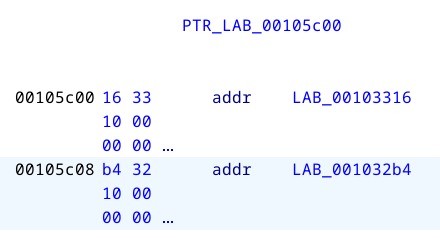
The second branch (taken when output is negative, rcx = 1) prints out "I need a very specific file to be available. Or do I?". The first branch, however, prints the string "One wall down!", and it can be reached when the file is opened successfully.
void UndefinedFunction_00103316(void)
{
undefined4 uVar1;
long unaff_RBP;
*(undefined4 *)(unaff_RBP + -0x4c) = 8;
uVar1 = FUN_00103370(*(undefined4 *)(unaff_RBP + -0x10));
*(undefined4 *)(unaff_RBP + -0x10) = uVar1;
uVar1 = FUN_00103370(*(undefined4 *)(unaff_RBP + -0x10),5);
*(undefined4 *)(unaff_RBP + -0x10) = uVar1;
uVar1 = FUN_00103370(*(undefined4 *)(unaff_RBP + -0x10),*(undefined4 *)(unaff_RBP + -0x4c));
*(undefined4 *)(unaff_RBP + -0x10) = uVar1;
__android_log_print(4,&DAT_00100a2f,"One wall down!");
/* WARNING: Could not recover jumptable at 0x0010336d. Too many branches */
/* WARNING: Treating indirect jump as call */
(**(code **)(*(long *)(unaff_RBP + -0x40) + (long)*(int *)(unaff_RBP + -0x44) * 8))();
return;
}
Looking at FUN_00103370, what it's doing is not immediately clear, but it's just doing some operations on some global values.
/* WARNING: Globals starting with '_' overlap smaller symbols at the same address */
int FUN_00103370(int param_1,int param_2)
{
int iVar1;
int *piVar2;
int *piVar3;
int local_38 [4];
int local_28;
undefined auStack_18 [4];
int local_14;
int local_10;
int local_c;
piVar3 = (int *)auStack_18;
local_10 = param_1;
local_c = param_2;
if (0x933c5b6d < (((DAT_00105b50 & _DAT_00105b54) / 0xe671c09a ^ 0x509a612a) & 0x2517461d)) {
piVar3 = local_38;
local_38[0] = param_2;
local_28 = param_1 * param_2;
}
do {
iVar1 = local_c;
piVar2 = piVar3 + -4;
piVar3 = piVar3 + -8;
*piVar2 = local_10;
*piVar3 = iVar1;
*piVar2 = *piVar3 * *piVar2;
local_14 = *piVar2;
} while ((DAT_00105b58 * DAT_00105b5c & 0xdb331b78U) == 0x5971cd31);
return *piVar2;
}
I just thought of it as a black box, perhaps some 'hash function', and postulated that these values are used to calculate the key and iv. Notice that the "One wall down!" branch calls this function with different values compared to the branch that prints "I need a very specific file to be available. Or do I?". Hence, I just assumed that as long as we reach the branch that prints the correct string, the correct values will be updated which will hopefully result in the correct key and iv later being printed. I applied the same logic to walls 2 and 3.
I tried creating the file at sys/wall/facer but it didn't work, even though I was root. So I tried replacing the file path with something I could write to by patching the binary:
... newdata = newdata.replace(b'/sys/wall/facer', b'/data/local/ttt') ...patch.py
For some reason, this still didn't work even though the file was clearly present. Eventually I just patched the assembly code itself, replacing
mov eax, 0x101
syscall
with
mov eax, 0x1
nop
nop
So it will be as if the syscall returned a fd of 1.
I updated patch.py:
... # handle file check j = 0x2277 newdata = newdata[:j] + b'\x01\x00\x00\x00\x90\x90' + newdata[j+6:] ...patch.py
Running the app with the patched libnative.so successfully prints One wall down!. However, there are more errors, more patching to be done. Let's look at the next function:
Second wall
undefined4 FUN_00101eb0(undefined4 param_1)
{
undefined4 uVar1;
uint local_2c;
undefined8 local_18;
undefined4 local_10;
undefined4 local_c;
local_c = param_1;
local_18 = 0x90ec8148e5894855;
local_10 = 0x48000000;
for (local_2c = 0;
(local_2c < 0xc &&
(FUN_00103430[(int)local_2c] == *(code *)((long)&local_18 + (long)(int)local_2c)));
local_2c = local_2c + 1) {
}
if (local_2c != 0xc) {
for (local_2c = 0; local_2c < 0xc; local_2c = local_2c + 1) {
FUN_00103430[(int)local_2c] = *(code *)((long)&local_18 + (long)(int)local_2c);
}
}
uVar1 = FUN_00103430(0x1,param_1);
return uVar1;
}
There is clearly some dynamic updating of executable code going on in the first part. However, upon inspection I realised it wasn't actually changing anything. Let's look at FUN_00103430:
void FUN_00103430(int param_1)
{
switch(param_1 == 0x539) {
case false:
__android_log_print(6,&DAT_00100a2f,"HAHAHA are you sure you\'ve got the right input parameter?"
);
/* WARNING: Could not recover jumptable at 0x001035a2. Too many branches */
/* WARNING: Treating indirect jump as call */
(*(code *)PTR_LAB_00105ba8)();
return;
case true:
__android_log_print(4,&DAT_00100a2f,"Input verification success!");
/* WARNING: Could not recover jumptable at 0x0010357a. Too many branches */
/* WARNING: Treating indirect jump as call */
(*(code *)PTR_LAB_00105b98)();
return;
}
}
It's checking that the first parameter is 0x539. However, it is clearly being passed the constant value of 0x1.
There are many ways to patch this, the solution I settled on was replacing 0x539 with 0x1:
# handle parameter check i = 0x2450 newdata = newdata[:i] + b'\x01\x00' + newdata[i+2:]patch.py
Now we get Input verification success!. Let's continue to the third function.
Third wall
This function is a bit longer. I retyped the function so that the first parameter is correctly typed as JNIEnv *. Now the code is much more understandable.
undefined4 FUN_00101f90(JNIEnv *param_1,uint param_2)
{
_func_259 *p_Var1;
JNIEnv *env;
jclass clazz;
jsize digestLen;
uint local_bc;
undefined8 local_a4;
undefined4 local_9c;
int i;
int local_94;
jbyte *local_90;
long local_88;
jbyte *local_80;
int local_74;
jbyteArray digest;
jobject p2bytes;
jmethodID String_getBytes;
jobject msgDigestSHA1;
jstring s_SHA_1;
jmethodID MessageDigest_digest;
jmethodID MessageDigest_update;
jmethodID MessageDigestClass_getInstance;
jclass MessageDigestClass;
jstring p2str;
char local_1f [11];
uint local_14;
JNIEnv *local_10;
local_14 = param_2;
local_10 = param_1;
sprintf(local_1f,"%d",(ulong)param_2);
p2str = (*(*local_10)->NewStringUTF)(local_10,local_1f);
MessageDigestClass = (*(*local_10)->FindClass)(local_10,"java/security/MessageDigest");
MessageDigestClass_getInstance =
(*(*local_10)->GetStaticMethodID)
(local_10,MessageDigestClass,"getInstance",
"(Ljava/lang/String;)Ljava/security/MessageDigest;");
MessageDigest_update = (*(*local_10)->GetMethodID)(local_10,MessageDigestClass,"update","([B)V");
MessageDigest_digest = (*(*local_10)->GetMethodID)(local_10,MessageDigestClass,"digest","()[B");
s_SHA_1 = (*(*local_10)->NewStringUTF)(local_10,"SHA-1");
msgDigestSHA1 =
(*(*local_10)->CallStaticObjectMethod)
(local_10,MessageDigestClass,MessageDigestClass_getInstance,s_SHA_1);
env = local_10;
p_Var1 = (*local_10)->GetMethodID;
clazz = (*(*local_10)->GetObjectClass)(local_10,p2str);
String_getBytes = (*p_Var1)(env,clazz,"getBytes","()[B");
p2bytes = (*(*local_10)->CallObjectMethod)(local_10,p2str,String_getBytes);
(*(*local_10)->CallVoidMethod)(local_10,msgDigestSHA1,MessageDigest_update,p2bytes);
digest = (*(*local_10)->CallObjectMethod)(local_10,msgDigestSHA1,MessageDigest_digest);
digestLen = (*(*local_10)->GetArrayLength)(local_10,digest);
local_74 = (int)digestLen;
local_80 = (*(*local_10)->GetByteArrayElements)(local_10,digest,(jboolean *)0x0);
local_88 = (long)local_74;
local_90 = local_80;
local_94 = 0;
for (i = 0; i < 0x14; i = i + 1) {
local_94 = (uint)(byte)local_80[i] + local_94;
}
local_a4 = 0xb0ec8148e5894855;
local_9c = 0x48000000;
for (local_bc = 0;
(local_bc < 0xc &&
(FUN_001035b0[(int)local_bc] == *(code *)((long)&local_a4 + (long)(int)local_bc)));
local_bc = local_bc + 1) {
}
if (local_bc != 0xc) {
for (local_bc = 0; local_bc < 0xc; local_bc = local_bc + 1) {
FUN_001035b0[(int)local_bc] = *(code *)((long)&local_a4 + (long)(int)local_bc);
}
}
local_14 = FUN_001035b0(local_94,local_14);
(*(*local_10)->ReleaseByteArrayElements)(local_10,digest,local_80,0);
(*(*local_10)->DeleteLocalRef)(local_10,p2str);
(*(*local_10)->DeleteLocalRef)(local_10,s_SHA_1);
(*(*local_10)->DeleteLocalRef)(local_10,p2bytes);
(*(*local_10)->DeleteLocalRef)(local_10,digest);
(*(*local_10)->DeleteLocalRef)(local_10,msgDigestSHA1);
(*(*local_10)->DeleteLocalRef)(local_10,MessageDigestClass);
return local_14;
}
Reversing the java part reveals that it does something like this (translated to python): local_94 = sum(hashlib.sha1(str(param_2).encode()).digest()). This value is then passed as the first parameter to FUN_001035b0:
void FUN_001035b0(int param_1)
{
__android_log_print(3,&DAT_00100a2f,"Bet you can\'t fix the correct constant :)");
switch(param_1 == 0x539) {
case false:
__android_log_print(6,&DAT_00100a2f,
"I\'m afraid I\'m going to have to stop you from getting the correct key and IV."
);
/* WARNING: Could not recover jumptable at 0x00103830. Too many branches */
/* WARNING: Treating indirect jump as call */
(*(code *)PTR_LAB_00105bc8)();
return;
case true:
/* WARNING: Could not recover jumptable at 0x001036e2. Too many branches */
/* WARNING: Treating indirect jump as call */
(*(code *)PTR_LAB_00105bc8)();
return;
}
}
Here's the relevant disassembly:
001035bb 48 8d LEA RAX,[switchD_0010366e::switchdataD_00105c30] = 0010380a
05 6e
26 00 00
001035c2 48 89 MOV qword ptr [RBP + local_10],RAX=>switchD_0010366e::switchdataD_00105 = 0010380a
45 f8
...
001035e6 8b 45 f0 MOV EAX,dword ptr [RBP + local_18] // param_1
001035e9 8b 0d MOV ECX,dword ptr [DAT_00100ba8] = 00000539h
b9 d5
ff ff
001035ef 29 c8 SUB EAX,ECX
001035f1 0f 94 c0 SETZ AL
001035f4 0f b6 c0 MOVZX EAX,AL
001035f7 89 45 f4 MOV dword ptr [RBP + local_14],EAX
001035fa 48 8b MOV RAX,qword ptr [RBP + local_10]
45 f8
001035fe 48 63 MOVSXD RCX,dword ptr [RBP + local_14]
4d f4
00103602 48 8b MOV RAX=>switchD_0010366e::switchdataD_00105c30,qword ptr [RAX + RCX*0x8]= 0010380a
04 c8
...
switchD_0010366e::switchD
0010366e ff e0 JMP RAX
So at the end, it's jumping to the code at switchD_0010366e::switchdataD_00105c30[param_1 - 0x539]. We clearly want to avoid the first branch, so let's look at the what the second branch does:
switchD_0010366e::caseD_1 XREF[3]: 0010366e(j),
00105bb8(*),
00105c38(*)
001036d6 48 63 MOVSXD RCX,dword ptr [RBP + local_2c]
4d dc
001036da 48 8b MOV RAX,qword ptr [RBP + local_28]
45 e0
001036de 48 8b MOV RAX,qword ptr [RAX + RCX*0x8]=>PTR_LAB_00105bc8 = 00103779
04 c8
001036e2 ff e0 JMP RAX=>LAB_00103779
local_2c and local_28 are constants previously set in the parent function:
00103606 48 8d LEA RCX,[PTR_LAB_00105b60] = 001032b4
0d 53
25 00 00
0010360d 48 89 MOV qword ptr [RBP + local_28],RCX=>PTR_LAB_00105b60 = 001032b4
4d e0
00103611 c7 45 MOV dword ptr [RBP + local_2c],0xd
dc 0d
00 00 00
So calculating the expected value, we should end up at jumping to the address at 0x105bc8:
PTR_LAB_00105bc8 XREF[2]: check_constant:001036d
check_constant:0010382
00105bc8 79 37 addr LAB_00103779
10 00
00 00
00105bd0 70 36 addr LAB_00103670
10 00
00 00
00105bd8 43 37 addr LAB_00103743
10 00
00 00
00105be0 e4 36 addr LAB_001036e4 // win function
10 00
00 00
00105be8 9b 37 addr LAB_0010379b
10 00
00 00
00105bf0 65 37 addr LAB_00103765
10 00
00 00
00105bf8 fe 37 addr LAB_001037fe
10 00
00 00
Looking at the code at LAB_00103779 we see it eventually leads to printing "Not like this..." However, we can also see that LAB_001036e4 is in the array of pointers, and it prints "I guess it's time to reveal the correct key and IV!". So by setting param_1 to 0x53a and replacing 0xd with 0x10 we should reach that branch.
However, there is a simpler solution. Looking back at switchD_0010366e::switchdataD we see the our desired destination is also in this array of pointers:
switchD_0010366e::switchdataD_00 XREF[3]: check_constant:001035b
check_constant:001035c
check_constant:0010360
00105c30 0a 38 addr switchD_0010366e::caseD_0
10 00
00 00
00105c38 d6 36 addr switchD_0010366e::caseD_1
10 00
00 00
PTR_LAB_00105c40 XREF[2]: check_constant:0010362
check_constant:0010362
00105c40 43 37 addr LAB_00103743
10 00
00 00
00105c48 70 36 addr LAB_00103670
10 00
00 00
PTR_LAB_00105c50 XREF[2]: check_constant:0010363
check_constant:0010364
00105c50 9b 37 addr LAB_0010379b
10 00
00 00
00105c58 e4 36 addr LAB_001036e4 // <-- here!
10 00
00 00
So if we set param_1 = 0x539 + 5, we should jump to the correct branch immediately!
For this patch, I replaced the following assembly:
sub eax, ecx ; eax = param_1, ecx = 0x539
setz al
movzx eax, al
with:
xor eax, eax
add eax, 0x5
nop
nop
nop
This was done in the patch.py script (assembly was compiled with pwntools asm function):
... # replace eax with the correct value ... k = 0x25ef newdata = newdata[:k] + b'1\xc0\x83\xc0\x05\x90\x90\x90' + newdata[k+8:] ...patch.py
Running the app with the patched libnative.so, there seem to be no errors, and a new key and iv is printed:
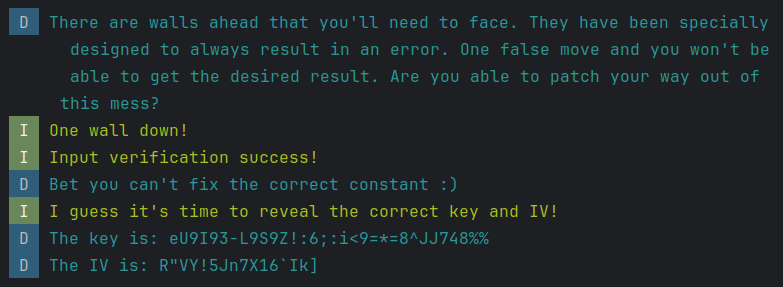
Running Decrypt.java with the updated key and iv, the flag is printed!
TISC{1_4m_y0ur_w4llbr34k3r_!i#Leb}
Here is the final patch.py script:
from Crypto.Util.number import long_to_bytes as ltb import lief with open('libnative.so', 'rb') as f: data = f.read() newdata = data[:] # handle file check j = 0x2277 newdata = newdata[:j] + b'\x01\x00\x00\x00\x90\x90' + newdata[j+6:] # handle parameter check i = 0x2450 newdata = newdata[:i] + b'\x01\x00' + newdata[i+2:] # replace eax with the correct value ... k = 0x25ef newdata = newdata[:k] + b'1\xc0\x83\xc0\x05\x90\x90\x90' + newdata[k+8:] with open('libnative1.so', 'wb') as f: f.write(newdata) lib = lief.parse('libnative1.so') for x in lib.exported_symbols: if x.name == 'Java_DynamicClass_nativeMethod': x.name = 'Java_com_a_a_Test_nativeMethod' lib.write('libnative1.so')patch.py
More debugging notes
While patching libnative.so, there were many times I needed to see what was actually going on in memory. I wasn't able to attach gdb or setup any other debugger, however I found the following approach sufficient:
I would replace a certain instruction with the \xcc opcode, as follows:
... # for debugging k = 0x2830 newdata = newdata[:k] + b'\xcc' + newdata[k+1:] ...patch.py
When android reaches this instruction, the app would crash a memory dump would be printed to LogCat:
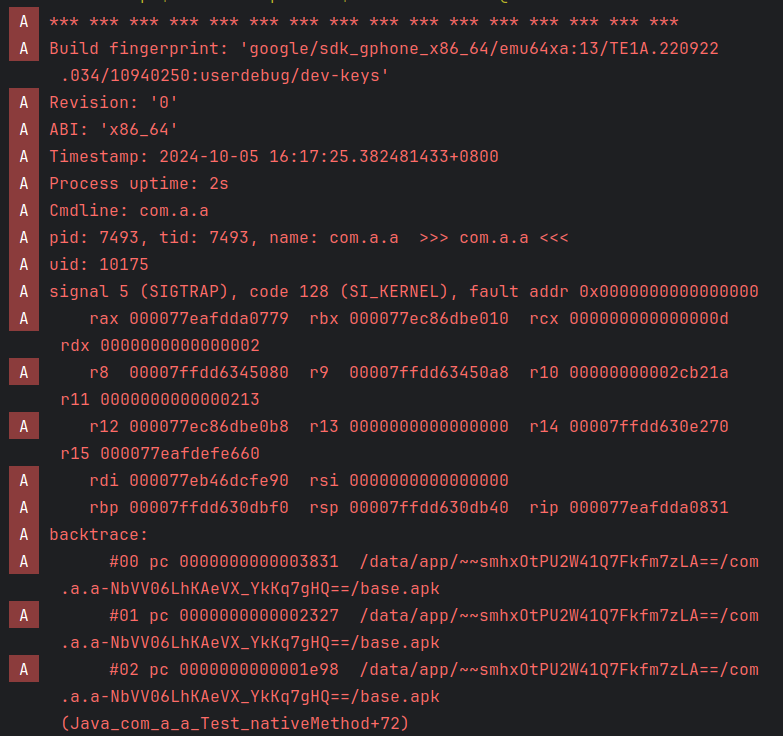
Thus, I was able to inspect the values of each register, which for this challenge was sufficient to debug effectively.